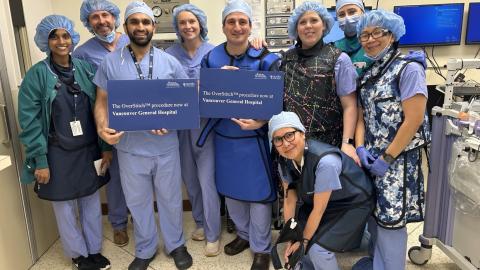Preparing for metabolic and bariatric surgery
We strongly recommend starting the steps outlined on this page well in advance of your orientation appointment with our team. You should begin researching bariatric surgery to prepare yourself for what to expect both before and after this life altering surgery. The goal is to gradually introduce lifestyle changes to food intake and exercise. By making changes slowly, you will increase the likelihood that these changes will last for the rest of your life.
Remember, bariatric surgery is just a tool, and durable lifestyle modifications are necessary for long-term success. Take advantage of this time to optimize your health and make the lifestyle changes necessary to achieve and sustain weight loss after surgery. Our team has created a manual that expands more on the topics in this article.
Research
Having a good understanding and reasonable expectations of bariatric surgery and how it will impact your life is essential for successful and long-term surgical outcomes.
Websites
- American Society for Metabolic and Bariatric Surgery (ASMBS)
- Bariatric surgery - Mayo Clinic
- Obesity Canada
- Obesity Help - Bariatric surgery support community
- Obesity Action Coalition
- Misconceptions about bariatric surgery - Globe and Mail 2014
Books
- Weight Loss Surgery for Dummies
- Weight Loss Surgery Work Book
- The Complete Weight Loss Surgery Guide and Diet Program
Choosing the type of surgery
Choosing the type of surgery that is right for you is an important step. You will meet with one of our bariatric surgeons to discuss the types of surgeries, their benefits and their risks. Please review the description of each type of surgery on our website before you meet the surgeons. Your surgeon will help you decide which surgery would be best you.
You can read patient testimonials on the Obesity Help website.
Weight loss
Learn how to eat and exercise in a way that will ensure your long-term weight loss goals. Patients who demonstrate significant lifestyle modification during the pre-conditioning phase will be considered for surgery.
Weight gain through the pre-operative stage may be associated with poor outcomes and surgical risks. Therefore, we encourage our patients to gradually lose weight prior to the surgery. We understand this is difficult for many patients, and weight stability may be a more feasible goal. This will be reviewed on an individual basis.
Start a diary
This diary is crucial to success! It allows patients and the members of the team to track progress and find areas where positive changes can be made.
- This can be in the form of a booklet, recorded on the computer or on a mobile phone app - many of our patients have found the MyFitnessPal and Baritastic app to be very useful.
- Write down daily food and beverage intake including types of foods, beverages and condiments. Record the quantities of each (e.g. grams, tablespoons, ounces, etc.). Don't forget to record snacks too as these types of foods are often an overlooked source of calories.
- Write down daily exercise activities including the type of exercise and duration.
- Record your weight once a week (first thing in the morning, on the same day and using the same scale).
- Bring the diary to each and every appointment with our team. Motivation and commitment are keys to being considered for bariatric surgery. Forgetting your diary shows a lack of both.
Nutrition
Make slow, progressive changes to your food intake. Remember the goal is balanced, healthy meals for durable, long-term change. You will meet the Dieticians regularly to they will review your diary and provide expert guidance on how to shop for food, how to cook your food, how to food prep, and how to read labels..
Learn more about nutrition before surgery on page 47 of our Richmond metabolic & bariatric surgery manual.
Videos
The nutrition videos below do not replace the individual advice you've been provided at your dietitian appointments or from your physician(s). They are simply to provide you with general information for learning purposes.
Dietary tips
- Gradually limit meals eaten at restaurants and fast-food outlets. You have much better control of the food you eat when you buy it and cook it yourself. Don't shop for groceries on an empty stomach – this helps to avoid impulsive decisions.
- Focus on fresh foods in the grocery store. These are a much better alternative to processed foods. Fresh foods are most often located along the outer aisles of a grocery store, while processed foods are located in the centre. If it comes frozen in a package and needs the microwave to cook it, it's often not the best choice.
- Get into the habit of reading labels. The more knowledge you have about foods you are eating, the more control you have over making healthier choices.
- Eat breakfast, lunch and dinner at similar times every day. Remember – breakfast really is an important meal that should not be missed. Aim to have 3 small meals and 2 snacks per day.
- Plan your meals the night before - again, it is very difficult to make good food choices when you're hungry! Planning ahead helps to prevent impulsive food choices.
- Separate solid foods from liquids by 30 minutes and vice-versa.
- Liquids should be limited to water, tea, skim milk and diluted, light cranberry juice.
- Drink 6-8 glasses of water a day.
- Food and drinks to avoid – It is obvious that some foods such as fried food and fast food are high in calories. Here are some items that you might not know are also high in calories that - jams, pop (diet pop is ok), juice, alcohol, condiments (including ketchup).
Physical activity
As with dietary changes, the goal is to gradually introduce exercise in a safe way in order to slowly condition your body and avoid injury. We encourage our patients to slowly work towards 30 minutes of sustained exercise daily as tolerated. HealthLink BC offers free resources for evidence-based physical activity information and professional guidance relating to exercise and physical activity for patients that need help getting active. To access the Physical Activity Services, call 8-1-1 and ask to speak with a Bariatric QEP (Qualified Exercise Professional).
Exercise tips
- Focus on cardiovascular exercise – not weights.
- Dedicated time should be set aside for exercise. Cleaning the house or walking around at work doesn't count!
- Start with walking, swimming or walking in the pool. Begin with 10-15 minutes at a time and gradually work your way up to 30-40 minutes a day, 6 times a week.
- Don't forget to record this in your diary.
Mental health
Even though bariatric surgery has a positive effect on many people's mental health in the long term, unaddressed trauma or mental health-related issues can increase vulnerability during the recovery period. While dysphoria or anxiety that is related to obesity can gradually be improved with weight loss, there are some patients who are unable to cope with the stresses of post-operative life and are at increased risk of self-harm. We require everyone to address mental health issues and be stable for at least 18 months (as confirmed by a family physician), and to have adequate support in place for purposes of risk reduction.
- Watch video: How mental health affects outcomes
Sleep apnea
Sleep apnea is a serious breathing disorder often found in obese patients. Everyone who enters the bariatric program will be evaluated and undergo a home sleep apnea test. If results are abnormal, a polysomnogram (sleep study) may be ordered in the Richmond sleep lab to provide a more comprehensive diagnostic assessment. A referral to our team respirologist may be required.
If you are diagnosed with sleep apnea, you will be fitted with an apparatus called a CPAP machine. It must be used every night. Diligent use of the CPAP machine improves the quality of restful sleep. More importantly, it helps to decrease the chance of cardiac and respiratory complications after surgery. Failure to use the machine may result in delay or cancellation of surgery.
- Watch video: Sleep apnea















